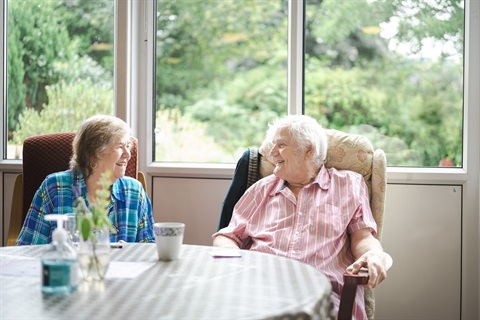Preventing and managing incontinence
Published on 12 February 2024

Did you know that one in four Australians are incontinent? Yet, despite being so common, many of us still find it hard to talk about this topic. More concerning is the fact that 70% of incontinent people do not seek the help they need, and their self-esteem, independence and quality of life can suffer as a result.
Many older people can feel that bladder and bowel control problems are just a part of ageing, and nothing can be done to prevent them or treat them. However, this is not true: there are many resources and services out there that are designed to help you manage continence problems comfortably and discretely.
What is incontinence?
Incontinence refers to a person’s accidental or involuntary loss of urine or faeces, which can range from minor leaks to a complete loss of bladder or bowel control.
Poor bladder control affects one in three women and one in ten men in Australia, while poor bowel control impacts approximately one in twenty Australians. All forms of incontinence can affect people of all ages and backgrounds, but certain factors that can increase your risk include menopause, obesity, some medications, reduced mobility and health conditions such as diabetes, heart conditions and prostate problems.
Signs that you or a loved one might have continence issues include:
- Getting up twice or more in the night to use the toilet
- Sometimes leaking when you sneeze, cough, laugh or lift something heavy
- Needing to plan your day around where the nearest toilet is, or having to rush to use the toilet
- Urine or faeces soiling your underwear
Can incontinence be prevented?
Leading a healthy lifestyle is key to preventing incontinence. Drinking more water during hot weather and cutting down on alcohol, soft drinks and coffee is important, as these can irritate the bladder. Additionally, it’s important to eat plenty of fibre every day. It’s worth noting too that you should never reduce your fluid intake in an effort to manage bladder control problems, as this could actually make matters worse as it will concentrate your urine.
Good toilet habits are also important. You should avoid constipation and straining, as this could weaken your pelvic floor over time. Only go to the toilet when you need to, rather than getting into the habit of going ‘just in case’, and visit your doctor as soon as you suspect a urinary tract infection.
How can incontinence be treated?
Managing continence issues at home is possible with the help of a routine and the right supports.
“We find that a lot of our clients have never discussed their incontinence issues with their GP,” says AccessCare nurse, Kate. “We always recommend that people discuss their incontinence with their GP, as there may be treatments available to reduce or treat the incontinence.”
Such treatments include medication changes or starting new medications to treat incontinence, pelvic floor exercises and using continence products such as pads, pants and bed protection. These can be purchased out of pocket or, if you’re eligible, through a government funded scheme like a Home Care Package.
Other strategies that can help you include using the National Public Toilet Map to find out where the closest toilets are to you when you’re out and about, and always carrying sufficient continence products (including cleaning and odour neutralising products) and a spare set of clothes when leaving the house.
You should also consider choosing clothes that are easy to remove, such as pants with elasticised waists rather than buttons, and using washable mattress and couch covers in your bedroom and living room. If you have mobility issues that also impact your ability to get to the toilet quickly, it could be worth installing grab rails in your bathroom.
More information
For further information and support, we suggest visiting the website of the Continence Foundation of Australia, which is the national peak body promoting bladder and bowel control health. Alternatively, if you are a client with AccessCare already, please consider speaking with your case manager about the supports available to you, or give our friendly team a call on 1300 819 200 for a confidential discussion about your personal situation.